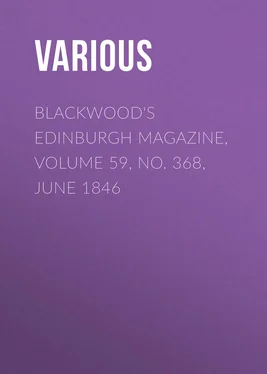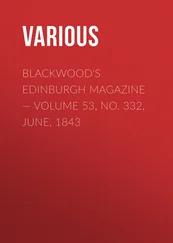Various - Blackwood's Edinburgh Magazine, Volume 59, No. 368, June 1846
Здесь есть возможность читать онлайн «Various - Blackwood's Edinburgh Magazine, Volume 59, No. 368, June 1846» — ознакомительный отрывок электронной книги совершенно бесплатно, а после прочтения отрывка купить полную версию. В некоторых случаях можно слушать аудио, скачать через торрент в формате fb2 и присутствует краткое содержание. Издательство: Иностранный паблик, Жанр: periodic, foreign_edu, Путешествия и география, на английском языке. Описание произведения, (предисловие) а так же отзывы посетителей доступны на портале библиотеки ЛибКат.
- Название:Blackwood's Edinburgh Magazine, Volume 59, No. 368, June 1846
- Автор:
- Издательство:Иностранный паблик
- Жанр:
- Год:неизвестен
- ISBN:нет данных
- Рейтинг книги:5 / 5. Голосов: 1
-
Избранное:Добавить в избранное
- Отзывы:
-
Ваша оценка:
- 100
- 1
- 2
- 3
- 4
- 5
Blackwood's Edinburgh Magazine, Volume 59, No. 368, June 1846: краткое содержание, описание и аннотация
Предлагаем к чтению аннотацию, описание, краткое содержание или предисловие (зависит от того, что написал сам автор книги «Blackwood's Edinburgh Magazine, Volume 59, No. 368, June 1846»). Если вы не нашли необходимую информацию о книге — напишите в комментариях, мы постараемся отыскать её.
Blackwood's Edinburgh Magazine, Volume 59, No. 368, June 1846 — читать онлайн ознакомительный отрывок
Ниже представлен текст книги, разбитый по страницам. Система сохранения места последней прочитанной страницы, позволяет с удобством читать онлайн бесплатно книгу «Blackwood's Edinburgh Magazine, Volume 59, No. 368, June 1846», без необходимости каждый раз заново искать на чём Вы остановились. Поставьте закладку, и сможете в любой момент перейти на страницу, на которой закончили чтение.
Интервал:
Закладка:
A new expedition was soon demanded at once by the curiosity of the people and the interests of science. The dream of a great southern continent was still the favourite topic of all who regarded themselves as philosophers in England, although Cook had sailed over an unfathomable ocean, in the very tract where he ought, according to this adventurous theory, to have found a continent. Sir Joseph Banks again gallantly volunteered to join the expedition which was equipped for the discovery. His large fortune enabled him to make unusual preparations; but such was his zeal, that he even raised a loan for the purpose. He engaged Zoffani, the painter, with three assistant draughtsmen. He selected two secretaries and nine attendants, instructed in the art of preserving plants and animals; he also provided books, drawings, and instruments. But his natural ambition was suddenly thwarted by the opposition of Sir Hugh Palliser, controller of the navy. For whatever reason – and it is now difficult to imagine any, except some jealousy too contemptible to name – so many obstructions were thrown in the way, that Banks relinquished the pursuit, and turned his attention to a voyage to Iceland. His suite, seamen and all, amounting to forty persons, reached the island in 1772, examined its chief natural phenomena, Hecla and its hot springs, and furnished its historian, Von Troil, with the materials for the most accurate history of this outpost of the northern world.
On his return to England, he commenced the career, natural to an opulent man of a cultivated mind, but yet so seldom followed in England by individuals of even higher means than his own. He fitted up a large house in Soho Square with all the preparatives for a life of literary association – a copious library, collections of natural history, and philosophical instruments. He held frequent conversaziones, gave dinners, and easily and naturally constituted himself the leader of the men of science in London. In Lincolnshire, where his chief property lay, he performed the part of the liberal and hospitable country gentleman on a large scale; while in London, he was the first person to whom scientific foreigners were introduced, and the principal patron and protector of ingenious men.
On the resignation of Sir John Pringle as President of the Royal Society, Sir Joseph Banks was placed in the chair, in 1778, almost by acclamation. He had some obvious qualifications for the office, but he as obviously wanted others. His opulence, his hospitality, and his zeal for science, were valuable, and are nearly indispensable in the president of a body which concentrates the chief intellectual force of the community. But his favourite pursuit, botany, has never deserved the name of a science, and inevitably bears a character of triviality in the eyes of the mathematician and the philosopher. The distinction given to a comparatively young man, known to the world only as a voyager, and a collector of plants and animals, not unnaturally tended to breed scoffing among the professors of the severe sciences. The feeling spread, and the opportunity for its expression was soon found. Dr Hutton, the mathematical professor at Woolwich, happened to be secretary for foreign correspondence. His residence at Woolwich was said to produce some inconvenience in his intercourse with the president; and the council passed a resolution, in 1783, recommending that "the foreign secretary should reside in London." The secret history of this transaction is, that Hutton was one of the mathematical party; though we cannot distinctly ascertain whether he had actually gone so far as to sneer at the president. Upon this Hutton resigned the office; to accept which, the emolument could not have been his object, the salary being but L.20 a-year – a sum that cannot be mentioned without a sense of disgrace to a society reckoning among its members some of the wealthiest men of England.
Hutton's resignation, or rather dismissal, produced an open war in the society. The mathematicians ranged themselves on the Huttonian side; the cultivators of natural history, and the cultivators of nothing, ranged themselves on the side of the president. The mathematicians were headed by Horsley, afterwards the bishop – a man whom Lord Brougham characterizes as extremely arrogant, of violent temper, and intoxicated with an extravagant sense of his own scientific merits, which his noble biographer pronounces to be altogether insignificant, heading this charge with the unkindest cut of all, namely, that he was "a priest." Horsley was certainly no great mathematician, as his publication of the Principia unluckily shows; but the picture is high coloured, which represents him as a hot-tempered, loud-tongued, bustling personage – a sort of bravo of science and theology, who took up the first opinion which occurred to him, scorned to rectify it by any after-thought, and plunged from one absurdity into another, for the sake of consistency. The eloquence of his attacks upon the chair, of whose possession he was supposed to be foolishly ambitious, was vaunted a good deal by his partisans. But, as the only evidence of his rhetoric in these squabbles ever quoted, is one sentence, it is like the pretension to wit on the strength of a single pun, and may be easily cast aside. This boasted sentence was uttered, in threatening the secession of the mathematical party. "The president will then be left with his train of feeble amateurs, and that toy (the mace) upon the table – the ghost of the Society in which Philosophy once reigned, and Newton officiated as her minister."
Horsley's theology was too nearly on a par with his mathematics – he was harsh and headlong. The fortunate folly of Priestley in challenging the English clergy to a trial of strength in the old arena of Unitarianism, gained him an opportunity of crushing an antagonist whose presumption was in proportion to his ignorance. Accordingly, the Unitarian was speedily put hors-de-combat , and Horsley was rewarded with a mitre.
The president had long felt that the purpose of this violent lover of parallelograms was, to unseat him. The question was therefore brought to a decision, in the shape of a resolution "approving of Sir Joseph Banks as president, and resolving to support him in his office." This resolution was carried by 119 to 43.
Honours began now to gather upon him. In 1788 he had been made a baronet. In 1795 he received the order of the Bath, then generally restricted to soldiers and diplomatists. In two years after, he was called to the Privy Council. On the death of the Duke of Ancaster he was chosen recorder of Boston; but, though often solicited to stand an election, he was never a member of Parliament. Though professing himself a Tory, he seems never to have taken any active part in politics, preserving a curious practical neutrality in Lincolnshire, and giving his interest to Mr Pelham, a Whig, and Mr Chaplin, a Tory. This, which his noble biographer curiously seems to consider as a happy proof of the absence of all party feelings, we should be apt to look upon as a proof of a degenerate wish to consult his own ease, and of a sluggish neutrality discreditable to the character of an Englishman.
However, he had more honourable distinctions. In the furious Revolutionary war – a war of principles and passions, not less than of public interests, the president of the Royal Society largely exerted his interest with both governments, to alleviate the sufferings of scientific men who happened to fall into the hands of the belligerents, and to effect the restoration of scientific property captured by our ships of war. In 1802 he was chosen one of the foreign members of the Institute of France; and his letter of thanks, a little too ardent in its gratitude, was said to have involved the baronet in some vexations peculiarly felt by his courtly temperament. He was instantly attacked for his Gallican panegyric, by a portion of the Royal Society. Cobbett, who was then looking out for a victim, and whose loyalty was at that period peculiarly glowing, flew at him like a tiger-cat; and, last and most dreaded of all, he was said to have received at Windsor some of those frowns, which to a courtier are a total eclipse of the sun. But the nation soon had higher things to think of than a slip of the President's pen, or a little betrayal of his vanity. Napoleon ascended the throne; and, when the thunderbolts began to fall, the squibs and crackers flung from hand to hand of little men are of necessity forgotten.
Читать дальшеИнтервал:
Закладка:
Похожие книги на «Blackwood's Edinburgh Magazine, Volume 59, No. 368, June 1846»
Представляем Вашему вниманию похожие книги на «Blackwood's Edinburgh Magazine, Volume 59, No. 368, June 1846» списком для выбора. Мы отобрали схожую по названию и смыслу литературу в надежде предоставить читателям больше вариантов отыскать новые, интересные, ещё непрочитанные произведения.
Обсуждение, отзывы о книге «Blackwood's Edinburgh Magazine, Volume 59, No. 368, June 1846» и просто собственные мнения читателей. Оставьте ваши комментарии, напишите, что Вы думаете о произведении, его смысле или главных героях. Укажите что конкретно понравилось, а что нет, и почему Вы так считаете.












